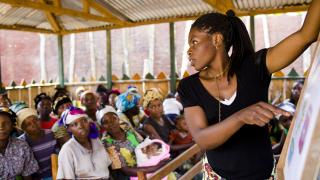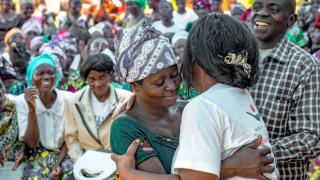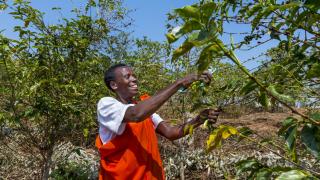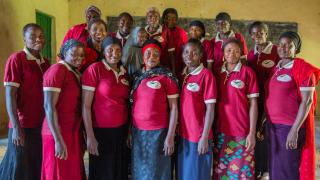Investing in DRC’s women entrepreneurs
For millions of women in conflict-affected countries, starting a business is a necessity, not a choice.
Restrictive gender norms, exacerbated by poverty and insecurity, limit women’s access to formal education and technical skills – cutting off routes into traditional employment.
Women also shoulder a vastly unequal burden of caregiving and household responsibilities – often amounting to hours of unpaid, physically exhausting work every day – reducing their capacity to take on a paid job.
As a result, self-employment is often the only viable option for women to earn a living. A recent World Bank report showed that women in Africa are more likely than men to be entrepreneurs, making up 58% of the continent’s self-employed population.
In the Democratic Republic of Congo, many of the women we serve are already entrepreneurs when they join our programme. They started businesses to help cover their families’ basic needs, displaying remarkable resourcefulness and determination in the face of severe economic constraints and pressure to conform to traditional gender roles. Common activities include selling surplus produce or cooked food at the market, or small-scale trading. But without access to finance, skills training and links to profitable markets, most women struggle to grow their enterprises and build sustainable routes out of poverty.
DRC’s weak infrastructure means that only 17% of the population is banked – and the rate for women is even lower, due to norms that require married women to have their husband’s permission to open a bank account. Only 3.6% of women-led enterprises have a bank loan, compared to 10.2% of male-led enterprises.
This explains why, despite the prevalence of women-led businesses, they continue to earn significantly lower profits than those owned by men – 34% less on average in Sub-Saharan Africa.
Our Stronger Women, Stronger Nations programme invests in the potential of women entrepreneurs through a holistic approach, which helps them overcome the barriers they face and participate in the economy on equal terms – so that they, and their businesses, can thrive. This year, support from players of People’s Postcode Lottery has allowed us to deliver a comprehensive package of training and support to 400 women in remote, conflict-affected communities in the Democratic Republic of Congo.
The economic empowerment training covers basic numeracy, understanding the market and how it works, developing a business idea, marketing, and simple accounting and record-keeping. Women also strengthened vital ‘soft’ skills in leadership, communication, negotiation, problem-solving and self-confidence – equipping them to identify new business opportunities and take measured risks.
Women are supported to form Village Savings and Loan Associations (VSLAs) – self-managed groups which allow members to save and invest money by buying shares. Women can then take out small loans from the savings pot to grow their businesses.
Our DRC team recently spoke to a number of women taking part in the training about how it has impacted their businesses and lives. Read their stories below.
Fazil
I am so happy with this training. I sell palm oil, peanuts, fried fish and vegetables in my small store. Before joining the programme I could never earn a profit.
Thanks to the lessons about accounting and business record keeping, I know which of my items are profitable and which need to be strengthened.
Elizabeth
Before joining the programme I used to be fully dependent on my husband. We have 4 children, 3 boys and a girl. My contribution to the family was to work in the fields, which was not easy. My vocational training (in the programme) was in selling fresh fish from Lake Tanganyika, which I am currently doing as my own small business. I set up the business with a loan from my savings group.
Today I am able to afford food, clothing, medical care and school fees.

My husband and I now make decisions together and are saving together towards household expenses and future projects.
Nafaranga
I used to wait for my husband to bring everything home, because I thought it was not my responsibility as a wife. Then, when I lost my husband, the only way to support my children was to take a job as a digger in a stone quarry.
I was lucky enough to join the Women for Women International programme where we learnt different topics. Among the most important were managing household finances, forming a savings group, and how to identify business opportunities within the community and choose which type of activity to do. Being in a group with other women brought solidarity and a mindset of “together we can”.
I got a loan of $100 from my savings group which I used to set up my own business supplying sand and gravel.

I am seeing changes in my life every day, which are miracles to me. I am no longer worried about food or clothing.
Read more
For World Entrepreneurs’ Day, we’re celebrating some recent success stories from businesswomen in Rwanda, DRC and Nigeria.
We Are "Hanya"
subtitle:
Women entrepreneurs in Iraq are preventing the spread of COVID-19.
July 3rd is International Cooperatives Day, and we're celebrating the power of women's collective enterprises to transform lives and communities.


